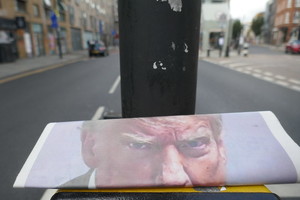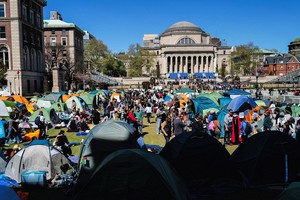Averting Armageddon: Learning to Talk About Nuclear Weapons

From the Left
I haven’t seen Oppenheimer yet, but I’m grateful that it has become a huge story. (And mightily amused by the Barbenheimer pairing!)
The Day After aired on TV in 1983, setting a record as the highest-rated television film in history. Most versions of The Day After include a disclaimer before the end credits, stating that the film is fictional and that the real-life outcome of a nuclear war would be much worse than the events portrayed onscreen.
"The catastrophic events you have just witnessed are, in all likelihood, less severe than the destruction that would actually occur in the event of a full nuclear strike against the United States. It is hoped that the images of this film will inspire the nations of this earth, their peoples and leaders, to find the means to avert that fateful day."
I remember seeing this movie 40 years ago. It was devastating. This film was a huge contributor to support for efforts to diminish the risk of nuclear war.
This century, nuclear weapons have not been top of mind for most people. Especially younger people who have not been exposed to the horror of what nuclear weapons can do. And perhaps nuclear war is just too frightening to think about, or the threat of climate change has filled the space for worry about the future of the earth.
Honestly, I believe we need to refocus our attention on reducing nuclear weapon risks while also addressing the issue of climate change. We need to do both.
In 2016, I had a Living Room Conversation with a diverse group that agreed that safe storage of nuclear materials and weapons, as well as ensuring that mistakes are not made with nuclear weapons, is a key priority. We agreed that we would like to see a future where nuclear weapons are no longer a threat. I suspect that this sentiment is universal. The question is, how do we get from here to there?
Our Living Room Conversation about nuclear weapons continues to be a solid way to start engaging. This is the opening paragraph:
Since the bombing of Hiroshima and Nagasaki, nuclear weapons have been a focal point in the discussion of international security. The number of nuclear weapons in existence worldwide are down from a peak of 68,000, yet acquiring nuclear weapons remains a priority for several countries. There are an estimated 13,000 nuclear weapons in storage, on alert or lost. The generation that first built and deployed nuclear weapons has passed and left responsibility for these weapons to us. What is the relevance and value of nuclear weapons in the modern age?
What is your answer to the question:
Do you see a path forward that leads us to a safer world? What is the role of nuclear weapons in that future world?
Joan Blades is Co-Founder of AllSides for Schools, LivingRoomConversations.org, MomsRising.org and MoveOn.org. She has a Left bias.
This piece was reviewed and edited by Isaiah Anthony, Deputy Blog Editor (Center bias).

April 29th, 2024

April 29th, 2024

April 26th, 2024

April 25th, 2024